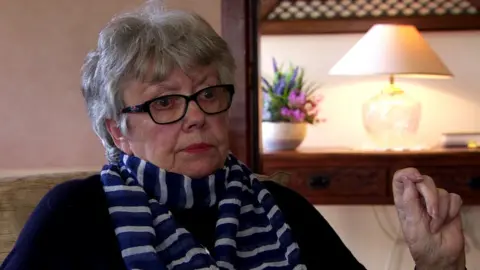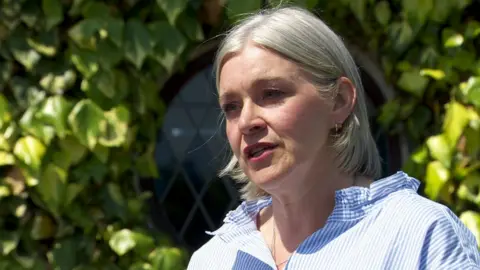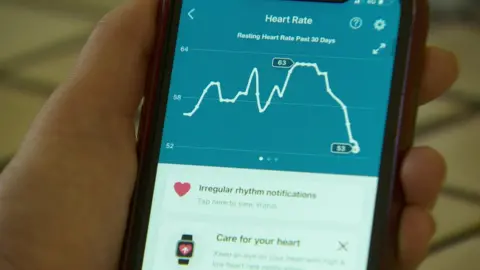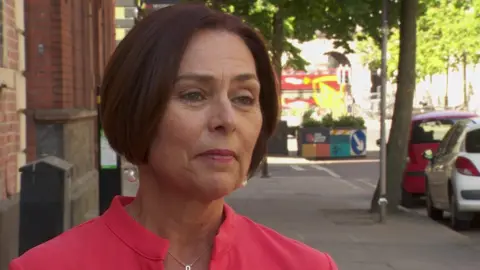New technology aims to prevent falls for elderly
 BBC
BBCA newly-funded project is claiming that new technology can detect signs of falls by older people up to 32 days before they occur.
Falling is one of the most significant issues affecting the health and wellbeing of the older population.
The project, Move More Live More, involves Age NI, the Public Health Agency (PHA), the Southern Health and Social Care Trust and Ulster University.
Phyllis McGahan is 84 and loves nothing more than walking, but that was not always the case.
"I had a bad fall a couple of years ago," she told BBC News NI.
"In the middle of it all there was Covid and I lost my husband, and I was not in a great place."
Phyllis got a new knee 18 years ago and said it was never right, but signing up for a research project - with the help of a smartwatch and technology - changed her life.
"If I am sitting for a long time, it tells me to get up and move," she said.
"It does not have to tell me that often now - it used to in the beginning, but now I know up here I have to walk.
"My walking would have been almost nil, and I sat around a lot.
"Today, with my watch I can do 8,000 steps and hope to go to nine [thousand] and maybe 10 [thousand]."
'Stay stronger for longer'
Phyllis is one of the first participants in the project which is aimed at health education, prevention and intervention to reduce falls in the over 65s.
Vicki Caddy from Age NI said: "At Age NI we really understand what an impact falls can have for older people and for those around them.
"We also now know, though, that falls are not an inevitable part of growing older.
"This programme is all about helping older people to stay stronger for longer."

The programme involves wearing a smart watch which monitors activity levels, sleep, heart rate and Sp02 (oxygen saturation).
The monitoring platform uses predictive analytics to detect changes which can indicate an increased risk of falling.
"In the background there is a software programme which benchmarks someone's normal patterns of activity, their normal amount of movement or heart rate or sleep in a day," Ms Caddy said.
"They establish a level for every individual on the programme.
"If there are any changes in that, the software will pick that up, even before the individual wearer would be aware that there was anything different.
"If those alerts are at a level that gives cause for concern, that data is passed through to a call centre.
"An individual will phone the person who is wearing the device, check everything is OK, see whether they need any assistance, whether they need any health advice and also see whether they are moving as much as they were and why not."
Ms Caddy said if additional help is needed at this stage, then there is a mechanism to get the person back into health care.
"There is a real safety net around this," she said.
"It is not just someone wearing a watch and relying on the technology.
"There is very much a human interface behind this as well."

The programme is open to people aged over 65 who are interested in trying the technology.
"It is brand new and people in Northern Ireland are being invited to be among the first people really to try it out.
"We have about 600 of these watches available, but we have places for up to 1,300 people."
The Public Health Agency said the cost of falls among the over-65s to the health service in Northern Ireland is estimated to be about £375m over two years.
Sandra Aitcheson, assistant director of nursing at the PHA , said falls have "a huge impact on older people, starting from fear, anxiety, social isolation, reduced mobility and moving on ultimately to independence and sometimes admission to nursing home".
She said when talking to older people the fear of falling is one of their biggest concerns.

"Falls are a major cause of disability and they are the leading cause of death as the result of an injury in people over the age of 75, particularly following a hip fracture," she said.
"Annual figures show that one in three over 65 year olds, and around half of over 85s will fall at least once.
"Pre-pandemic, more than 26,000 older people a year attended emergency departments here after a fall."
Ms Aitcheson said preventing falls is the first step and this project will help that.
"This bit of kit, this wonderful little watch, really has the potential to help keep older people well and more fit and more able and to keep them strong so they don't end up one of those 26,000 in A&E," she said.
